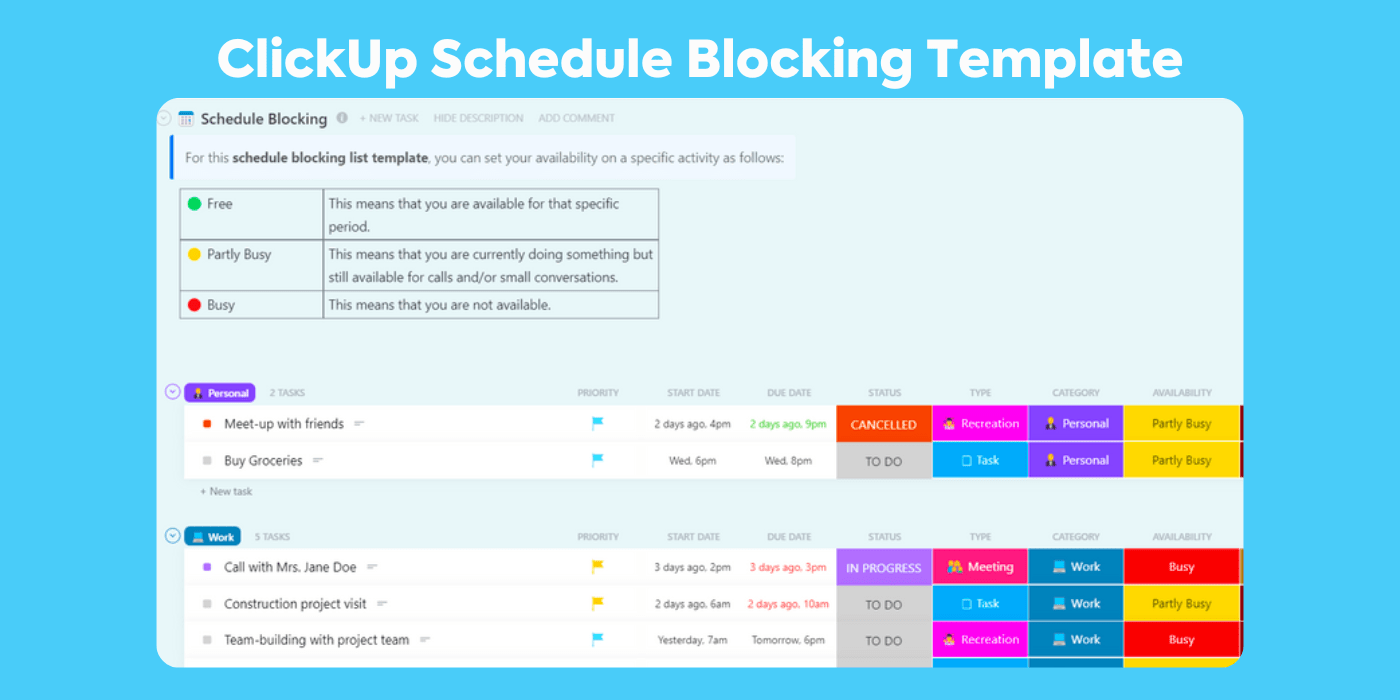مرحبًا بك في الصراع اليومي لحياة العمل الحديثة - تبدأ مهمة ما بأفضل النوايا، لتجد نفسك تائهًا في تطبيق تيك توك بعد دقائق. تلقي نظرة سريعة على بريدك الإلكتروني وفجأة تحتاج إلى شطيرة سريعة.
لقد مررنا جميعًا بهذه التجربة - المعركة المحبطة لمحاولة التركيز في العمل وسط المشتتات.
انضم إلينا في رحلة لإتقان التركيز والتركيز وسط الفوضى اليومية. إذا كنت قد سئمت من محاربة المشتتات، فلدينا حيل للتركيز من أجلك.
ولأولئك الذين يبحثون عن حليف رقمي في معركة التركيز، ترقبوا معنا لنستكشف كيف تساعدك أدوات مثل ClickUp على استعادة تركيزك وزيادة انتباهك.
دعونا نتعمق في الأمر!
لماذا لا أستطيع التركيز في العمل؟
إن التركيز في العمل هو صراع حقيقي، خاصةً في ثقافةٍ حيث الإفراط في ثلث العمال يعملون أكثر من 48 ساعة في الأسبوع.
لا عجب أن تكون مشتتاً في بعض الأحيان!
ولنواجه الأمر: يصبح التركيز حلماً بعيد المنال عندما تشعر بالملل أو التشتت.
ولكن الأمر لا يتعلق فقط بالإرهاق. فالإشعارات المستمرة، ورسائل البريد الإلكتروني، ومتطلبات تعدد المهام، وعدم الاهتمام بمهام معينة، والإجهاد يمكن أن يعرقل تركيزك.
حسنًا، كيف يمكنك تعزيز تركيزك مع كل هذه الملهيات؟ أولاً، قم بتحليل مراحل تركيز الدماغ حتى تفهم نفسك بشكل أفضل.
مراحل التركيز في الدماغ ## مراحل التركيز في الدماغ
ينطوي التركيز على تفاعل معقد بين الوظائف الإدراكية والشبكات العصبية في دماغك. ستمنحك معرفة مراحل التركيز لمحة عن كيفية تعامل دماغك مع الانتباه والتركيز.
فيما يلي مراحل التركيز المختلفة في الدماغ البشري:
- المدخلات الحسية: تبدأ باستيعاب المعلومات من محيطك من خلال حواسك - البصر والصوت واللمس وغيرها
- التقاط الانتباه: تجذب بعض الأشياء انتباهنا بسهولة أكبر. هنا، يقوم الدماغ بتحديد أولويات المعلومات واختيار معلومات معينة لمزيد من المعالجة
- الانتباه الانتقائي: بمجرد أن يستحوذ شيء ما على انتباهنا، يقوم الدماغ بالتركيز على تفاصيل محددة مع تصفية الأشياء غير ذات الصلة، مما يساعدنا على الاستمرار في التركيز على المهمة التي بين أيدينا
- ذاكرة العمل: اعتبرها مخزن الذاكرة قصيرة المدى في دماغك. فهي تتيح لنا الاحتفاظ بالبيانات ذات الصلة بالمهمة ومعالجتها ومعالجتها
- الوظائف التنفيذية: إذا كانت المهمة أكثر تعقيداً، فإن الوظائف التنفيذية تلعب دورها. وهذه الوظائف هي العمليات الإدراكية عالية المستوى مثل التخطيط والتنظيم والبدء في الإجراءات
- التركيز الموجه نحو الهدف: وأخيرًا، يقوم دماغك بربط كل شيء معًا، ويمزج المعلومات من أجزاء مختلفة للحفاظ على تركيز واضح وهادف على أهدافك وأولوياتك
علم الأعصاب وراء قلة التركيز
إن معرفة ما يعطل مراحل تركيزنا سيساعدنا على تحسين تركيزنا. إليك الأساس العصبي لسبب فقداننا للتركيز:
- التشتت والشبكات العصبية: يتلخص مدى سهولة تشتت انتباه دماغك في توازن النشاط في الشبكات المختلفة، مثل شبكة الوضع الافتراضي (للتجول الذهني) والشبكة الإيجابية للمهام (للانتباه الموجه نحو الهدف). يمكن أن يؤدي عدم التوازن في هذه الشبكات إلى صعوبة الحفاظ على التركيز
- النواقل العصبية وتنظيم الانتباه: المواد الكيميائية مثل الدوبامين والنورادرينالين تبقي انتباهنا تحت السيطرة. وإذا اختل توازن مستوياتهما (بسبب الوراثة، أو الإجهاد، أو الأدوية، أو تعاطي المخدرات، أو الاضطرابات العصبية، أو التغيرات الهرمونية، أو النظام الغذائي والتغذية، أو عوامل أخرى)، فقد يؤثر ذلك على قدرتنا على التركيز
- بنية الدماغ واضطرابات الانتباه: يمكن أن تؤثر الاختلافات في بنية الدماغ بسبب حالات الصحة العقلية، مثل اضطراب نقص الانتباه وفرط النشاط (ADHD)، على الانتباه والتركيز. يساعد فهم هذه الاختلافات الهيكلية في تطوير تدخلات مستهدفة
- مستويات التوتر والكورتيزول: عندما ترتفع مستويات التوتر ويبدأ هرمون الكورتيزول، وهو هرمون التوتر، في التأثير على انتباهك وتركيزك. يمكن أن يؤدي الإجهاد المزمن إلى تغيرات هيكلية ووظيفية في الدماغ، مما يؤثر على الأداء المعرفي
الأسباب الشائعة لصعوبة التركيز في العمل
إذا كنت تجد صعوبة في التركيز وتواجه صعوبة في التركيز في العمل، فإليك بعض الأسباب المحتملة:
1. التسويف وتأثيراته على التركيز
المماطلة هي عندما تتهرب من المهام الحرجة، وتقنع نفسك بأنك ستعالجها لاحقًا.
يؤدي التأجيل المستمر للأمور إلى زيادة الضغط النفسي وإضعاف إنتاجيتك. كما أن التسويف يعبث بتركيزك في العمل، مما يسبب تأخيرات وتشتيتات غير ضرورية.
تخيل أنك أجلت تقريرًا مهمًا حتى اللحظة الأخيرة. أنت مرهق ومتعب ولا يمكنك التركيز في الليلة التي تسبق موعد تسليمه. بينما تقوم بتجميع التقرير على عجلة، قد تفوتك بعض التفاصيل الحيوية، مما يؤثر على الجودة الإجمالية لعملك.
عندما تقوم بتأجيل المهام، فإن المواعيد النهائية القادمة تخلق ضغطًا وشعورًا بالإلحاح. هذا المستوى المرتفع من التوتر يمكن أن يضعف وظائفك الإدراكية ويسبب لك مشكلة في التركيز على مهمة صعبة.
2. الحرمان من النوم وتأثيره على التركيز
يعمل دماغك على مدار الساعة طوال أيام الأسبوع. عندما تنام، فإنه يأخذ استراحة لإعادة الشحن. أثناء النوم العميق، تقوم خلايا دماغك بإصلاح نفسها واستعادة التوازن (التوازن الداخلي). وهذا يساعد على تهيئة دماغك لليوم التالي.
ومع ذلك، فإن النوم غير الكافي أو غير المنتظم يرهق خلايا دماغك، مما يؤدي إلى ضبابية الدماغ. يؤخر الحرمان من النوم انتقال إشارات الدماغ، مما يجعل من الصعب التركيز ويتركك متعبًا طوال اليوم.
على سبيل المثال، لديك عرض تقديمي مهم في العمل في اليوم التالي. ومع ذلك، فإنك تسهر لوقت متأخر لمشاهدة مسلسل تلفزيوني بنهم شديد، ولا تنام سوى بضع ساعات من النوم.
وهذا يزيد من مستويات الكورتيزول لديك - وهو هرمون الإجهاد سيئ السمعة الذي يزيد من التوتر ويؤثر سلبًا على تركيزك. وفي اليوم التالي، أثناء العرض التقديمي، تجد صعوبة في التعبير عن أفكارك بوضوح والبقاء على المسار الصحيح.
3. الحالات الصحية التي تؤثر على التركيز
قد يرجع عدم التركيز إلى مشاكل صحية مختلفة. يمكن أن تؤثر المشاكل الصحية العقلية والجسدية على تركيزك ومدى انتباهك.
بعض الحالات التي تؤثر على تركيزك هي
- اضطراب نقص الانتباه وفرط النشاط (ADHD)
- اضطراب الوسواس القهري (OCD)
- الاكتئاب
- القلق
- الأرق
- مشاكل سكر الدم/ضغط الدم
اكتشفي علامات وأعراض هذه الحالات الصحية في وقت مبكر للتدخل السريع والتعامل الفعال معها. تواصل مع أخصائيي الرعاية الصحية للحصول على الإرشادات المناسبة للتعامل مع كل ما يؤثر على تركيزك.
4. اضطراب نقص الانتباه/فرط النشاط وتأثيره على التركيز
اضطراب نقص الانتباه/فرط النشاط (ADHD) هو حالة طبية تؤثر على كيفية عمل الدماغ. ويجد الأشخاص المصابون باضطراب نقص الانتباه وفرط النشاط صعوبة في الحفاظ على التركيز، ويتشتت انتباههم بسهولة، ويجدون صعوبة في الجلوس بثبات.
يمكن للمهام التي يجدها الآخرون قابلة للإدارة أن تكون صعبة بالنسبة للشخص المصاب باضطراب فرط الحركة ونقص الانتباه، خاصةً المهام البطيئة والطويلة أو تلك التي تتأخر فيها المكافآت أو المهام المتكررة.
الأمر أكثر من مجرد نقص في التركيز، بل هو أكثر من مجرد عدم التحكم الكامل فيما تركز عليه. يمكن أن يظهر عدم السيطرة بطرق مختلفة، مثل صعوبة بدء المهام، أو شرود الذهن، أو التركيز المفرط على عوامل غير مهمة.
على سبيل المثال، تخيل أنك في اجتماع وتحاول الاستماع إلى المتحدث، ولكن مع اضطراب فرط الحركة ونقص الانتباه وفرط النشاط، قد يتشتت انتباهك بسهولة بسبب أشياء مثل وميض ضوء أو نقر شخص ما على قلم.
حتى لو حاولت جاهدًا، فقد تفوتك تفاصيل مهمة في الاجتماع، مما يؤثر على أدائك في العمل بشكل عام.
_تحقق من هذه
_ href/_ https://clickup.com/blog/adhd-apps// تطبيقات_ADHD %/%href/_
!
5. كيف تؤثر حالات مثل الاكتئاب واضطرابات القلق على التركيز
يغطي الاكتئاب والقلق نطاقًا واسعًا من الحالات مثل الاكتئاب والقلق، حيث يجلب عوامل مثل التشوهات الإدراكية واختلال توازن الناقلات العصبية وضغوطات الحياة. وتؤثر هذه العوامل مجتمعة على قدرتك على التركيز.
تجعل هذه الحالات، مع الاختلالات الكيميائية والتغيرات الهيكلية في الدماغ، الحفاظ على الانتباه والأداء المعرفي أمرًا صعبًا.
يعرقل الاكتئاب نومك ومزاجك ومستويات التوتر لديك، مما يجعلك تشعر بعدم الحافز والتزام الفراش. ومن ناحية أخرى، يؤدي القلق إلى القلق المفرط والضغط النفسي على الأشياء الصغيرة وتشتيت الانتباه عن الأمور المهمة.
كلاهما يمكن أن يفقدك تركيزك ويجعل إكمال الأعمال اليومية أكثر صعوبة.
6. عواقب الإرهاق والإرهاق على التركيز في العمل
الإرهاق يعني الشعور بالتعب الشديد، وانخفاض مستويات الطاقة وصعوبة التركيز. ويمكن أن يجعل التركيز صعبًا، ويقلل من مدى انتباهك، ويزيد من فرص ارتكاب الأخطاء. كما أنه يعيق قدراتك على حل المشكلات واتخاذ القرارات، مما قد يؤثر على أدائك في العمل.
عادةً ما يحدث الإنهاك، وهو مزيج مزمن من الشعور بالإرهاق الجسدي والعاطفي، عندما يتراكم الإجهاد وكثرة العمل. ولا يقتصر الأمر على الشعور بالتعب فحسب، بل يؤثر أيضًا على عقلك وعواطفك.
عندما يبدأ الإرهاق في الظهور، فإنك ترتكب المزيد من الأخطاء، مما يزيد من الضغط النفسي ويجعلك أكثر عرضة للإرهاق. على الجانب الآخر، يستنزف الإرهاق طاقتك أكثر ويؤدي إلى الإرهاق بسبب الضريبة العاطفية.
تستمر هذه الدورة، مما يشكل تحديًا لتركيزك في العمل.
7. تأثير محاولة تعدد المهام مقابل التركيز على مهمة واحدة في كل مرة
عندما تكون لديك قائمة مهام طويلة، فإن إغراء تعدد المهام أمر حقيقي. قد تعتقد أنك محترف في تبديل السياق وكونها مثمرة للغاية. ومع ذلك، فإنه ليس مفيدًا كما يبدو. تشير الدراسات إلى أن إعادة التوجيه تستغرق ما يصل إلى 23 دقيقة للتبديل بين المهام بالكامل
إن تعدد المهام يجعل عقلك يتنقل بين المهام، مما يسبب الإرهاق الذهني ويقلل من الإنتاجية ويزيد من احتمالية ارتكاب الأخطاء.
ومن ناحية أخرى، فإن تكريس انتباهك لمهمة واحدة يلغي الحاجة إلى التبديل المستمر بين المهام. هذا النهج المركز أكثر كفاءة من حيث الوقت، ومن المرجح أن تكمل المهمة بكفاءة أكبر، مع أخطاء أقل، وبدون الخسائر الذهنية الناجمة عن تعدد المهام المستمر.
8. التعامل مع الضغط والإجهاد يربك ويسبب قلة التركيز
يمكن للشعور بالضغط أو التوتر أن يقلل من تركيزك، خاصةً في المواقف التي تتسم بالضغط الشديد مثل الوفاء بالمواعيد النهائية، أو التعامل مع التوقعات، أو مطاردة الأهداف الشخصية. يزيد الضغط من صعوبة الحفاظ على التركيز.
عندما تكون متوترًا، يفرز جسمك هرمون الكورتيزول، وإذا ظل مرتفعًا لفترة طويلة جدًا، فإنه يضعف تركيزك ومهاراتك في اتخاذ القرار.
إن التعامل مع الضغط المستمر والمواقف الصعبة - مثل المواعيد النهائية الضيقة أو النزاعات أو التوقعات العالية أو التغييرات في العمل - يجعل من الصعب الحفاظ على التركيز على المهام. يكون الاستمرار في التركيز على أفكار محددة أصعب عندما يكون عقلك قلقًا.
9. دور المشتتات البيئية في تدمير التركيز
يمكن لعوامل بيئية عديدة أن تشتت انتباهك؛ وللأسف لا يمكنك أن تغلق عقلك عن التفكير في الابتعاد عنها.
فهم هذه العوامل وإدارتها مفسدات الإنتاجية يساعدك على إنشاء مساحة عمل مركزة.
الضوضاء عامل شائع - المحادثات الصاخبة أو حركة المرور أو الاضطرابات. فهي تؤثر على التركيز وتعيق التركيز.
الفوضى هي عامل تشتيت بيئي آخر. يمكن أن تؤدي مساحة العمل غير المنظمة أو الفوضوية إلى زيادة التحفيزات البصرية، مما يجعل تحديد الأولويات والتركيز على مهام محددة أمرًا صعبًا. يمكن أن تشتت انتباهك مقاطعات الهاتف الذي يرن بالإشعارات أو الزملاء الذين يمرون عليك.
10. تأثير نقص الحافز أو عدم الاهتمام بالعمل على التركيز
عندما تحب عملك، يصبح التركيز سهلاً، وتتحمل المسؤولية، ولا تشعر بأن العمل عملًا روتينيًا. ولكن ماذا لو كان الذهاب إلى العمل يبدو وكأنه سباق ماراثون لم تشترك فيه؟
يمكن لنقص الحافز أن يجعل حتى أبسط المهام تبدو وكأنها عبء ثقيل.
عندما تكون متحمسًا لمهمة ما، فإن دماغك يفرز مواد كيميائية مثل الأوكسيتوسين الذي يبقيك متيقظًا ومركزًا. ولكن عندما يكون الحافز منخفضًا، تصبح المهام أكثر صعوبة بسبب عدم الاهتمام، ويصبح التركيز أشبه بمحاولة التلاعب ويداك مقيدتان خلف ظهرك.
## استراتيجيات لتحسين التركيز والإنتاجية
الآن بعد أن فهمت سبب فقدانك للتركيز في العمل دعنا نرى كيف يمكننا معالجة هذه التحديات:
1. استخدم الأدوات التي تعزز التركيز
ClickUp هو أداة متعددة الاستخدامات لإدارة المشاريع مصممة لتعزيز التعاون والإنتاجية. يساعدك هذا التطبيق المتكامل في الحفاظ على تركيزك وإنتاجيتك. فهو يساعد على منع المشتتات مثل وسائل التواصل الاجتماعي ومواقع الويب التي تهدر الوقت وإنشاء مساحة رقمية مركزة، مما يتيح لك التركيز على المهام والأهداف.
دعنا نستكشف ميزات ClickUp التي ستساعدك أنت وفريقك في الحفاظ على التركيز في العمل.
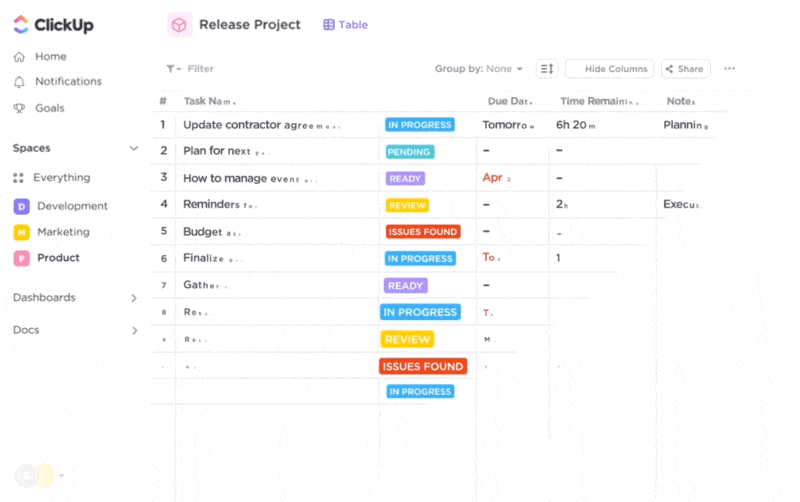
ركز على ما هو أكثر أهمية مع ClickUp Project Management
- إدارة المهام القابلة للتخصيص:مهام ClickUp Tasks يوفر نهجًا مخصصًا لإدارة العمل وتنظيمه وتحديد أولوياته. خصص مساحة العمل الخاصة بك لتناسب احتياجاتك بكل سهولة. ركز على المهمة التي بين يديك دون التقيد بهيكلية صارمة
![]()
تتبع الوقت وتعيين التقديرات وإضافة الملاحظات وعرض تقارير عن وقتك من أي مكان باستخدام المؤقت العام في ClickUp
- إدارة الأهداف: قم بتبسيط كيفية تتبع أهداف العمل وتحقيقها باستخدامأهداف ClickUp جعل إدارة الأهداف مركزية، مما يسهل عليك الحفاظ على التنظيم والتركيز على تحقيق النجاح في العمل. ابقَ مسؤولاً مع جداول زمنية واضحة وأهداف قابلة للقياس. تعمل ميزة التتبع التلقائي للتقدم المحرز على التخلص من التحديثات اليدوية، بينما يضمن خيار تعيين أنواع مختلفة من الأهداف المرونة
- تعزيز التعاون: يمكنك تبسيط التواصل والعمل الجماعي في جميع أنحاء مؤسستك من خلال ميزات مثل تعدد المهام، وإسناد المهام لأكثر من شخص، وسلاسل التعليقات لمناقشة مواضيع محددة. احصل على جميع الاتصالات المتعلقة بالعمل في نظام أساسي مركزي واحد، مما يوفر الوقت ويزيل الحاجة إلى التبديل بين الأدوات أو المنصات المختلفة
- النماذج: أنجز المزيد من المهام في وقت أقل باستخدامقوالب الإنتاجية-هي مصممة مسبقًا لأنشطة مثل تنظيم المهام والتخطيط اليومي، بحيث يمكنك إنجاز المزيد من المهام بسرعة دون البدء من الصفر. بفضل أطر العمل الواضحة، يتيح لك ClickUp التركيز على إنجاز المهام بدلاً من التفكير في كيفية تنظيم عملك
- التكاملات: أنشئ مركزًا مركزيًا للمعلومات باستخدامتكاملات ClickUp. هل تمنيت يومًا أن تكون جميع أدواتك في مكان واحد؟ ClickUp يوفر لك ذلك. فهو ينشئ بيئة عمل متصلة من خلال جمع أكثر من 1000 أداة في واجهة موحدة. يمكنك التركيز بشكل أفضل، وتقليل التبديل بين السياقات، وتعزيز الكفاءة، وتبسيط سير العمل. بعض من أفضل عمليات التكامل هي Slack وGmail وDropbox وZapier
وفر الوقت مع ClickUp

تصور اجتماعاتك المؤجلة وقم بإدارتها من خلال عرض التقويم في ClickUp
- تتبع الوقت: حقق أقصى استفادة من وقتك واحصل على رؤى حول إنتاجيتك من خلال ميزات تتبع الوقت سهلة الاستخدام في ClickUp. يمكنك تعديل الوقت يدويًا وإضافة الملاحظات باستخدام ClickUp، وربط الوقت الذي يتم تتبعه بمهام محددة باستخدام المؤقت العام والتكامل مع التطبيقات الشائعة مثل Harvest وEverhour وToggl وغيرها. بالإضافة إلى ذلك، يمكنك استخدام ملحق Chrome المجاني لتسجيل الوقت بسلاسة من سطح المكتب أو الهاتف المحمول أو متصفح الويب
- عرض التقويم: تخطيط المشاريع وتعيين الجداول الزمنية وتصور تقدم فريقك علىعرض التقويم في ClickUpتقويم مرن لتعاون سلس. يمكنك عرض التقويم الخاص بك بسهولة حسب اليوم أو الأسبوع أو الشهر وتتبع المشاريع في لمحة سريعة. يمكنك مشاركة المهام وجدولتها باستخدام وظيفة السحب والإفلات في ClickUp، وبدء الاجتماعات من عرض التقويم، ومزامنة المهام مع تقويم Google، واستخدام المهام المرمزة بالألوان للتنظيم
- حظر الوقت: قم بإدارة وتخطيط أيامك وأسابيعك وشهورك باستخدامقوالب حظر الوقتالتي تقسم ساعاتك وتنظمها لإكمال المزيد من المهام. يساعدك ذلك على تحقيق أقصى استفادة من وقتك مع الحفاظ على الحافز لإكمال المهام الضرورية. توفير هيكل واضح لركن أفكارك ومهامك ذات الأولوية المنخفضة لمواصلة إنجاز المهام دون تشتيت الانتباه
- التذكيرات: عزز تركيزك ووفر وقتك في العمل باستخدامتذكيرات ClickUp ميزة. حافظ على تنظيمك مع تذكيرات التعليقات والمحادثات، مما يضمن لك قراءة جميع المناقشات المهمة. احصل على ملخص يومي في بريدك الإلكتروني للبقاء على اطلاع على المهام المستحقة والأنشطة القادمة والعناصر المتأخرة. يمكنك أيضًا تفويض التذكيرات إلى فريقك دون عناء لسير عمل سلس
حافظ على تركيزك مع طرق عرض ClickUp
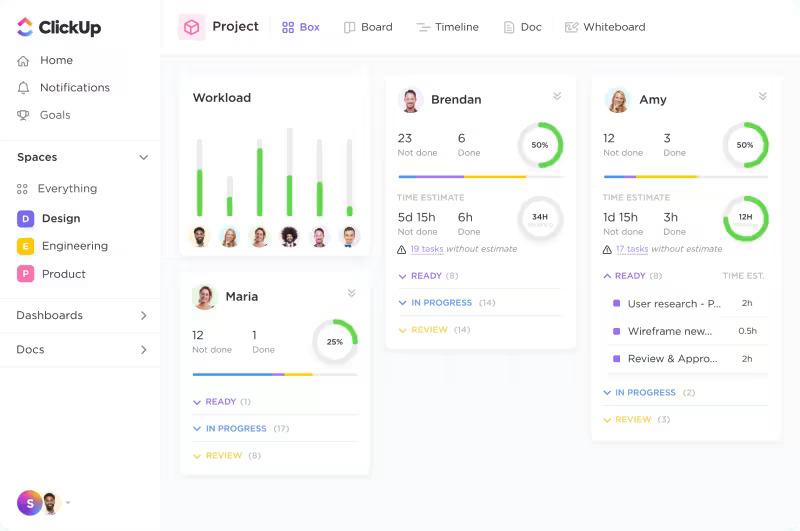
تسمح طريقة عرض Box بإعادة تعيين الوظائف ومراقبة قدرة العمل وتعليقات أعضاء الفريق. وهذا بدوره يساعد في إدارة موارد الفريق والحفاظ على الأولويات وتحسين التواصل والتعاون.
موازنة أعباء العمل مع طرق عرض ClickUp . هذه خيارات عرض قابلة للتخصيص بالكامل لمساعدتك على تصور مهامك وإدارتها بكفاءة.
- طريقة عرض اللوحة: تجميع المهام حسب عضو الفريق أو الأولوية، مما يضمن توزيعًا متوازنًا للعمل
- عرض القائمة: إنشاء قوائم مهام مفصلة، وفرزها حسب الأولوية أو تاريخ الاستحقاق. توفر طريقة العرض هذه نظرة عامة شاملة، مما يتيح لك تخصيص الموارد بشكل فعال
- طريقة عرض المخطط البياني: تصور تبعيات المهام والجداول الزمنية. يساعدك هذا أيضًا على تحديد المسارات الحرجة وتخصيص الموارد وفقًا لذلك للحفاظ على توازن عبء العمل في فريقك
- عرض المربع: احصل على منظور شامل لتوزيع المهام وتعديل المهام بناءً على نقاط قوة أعضاء الفريق ومدى توافرهم
استكشف ClickUp Brain
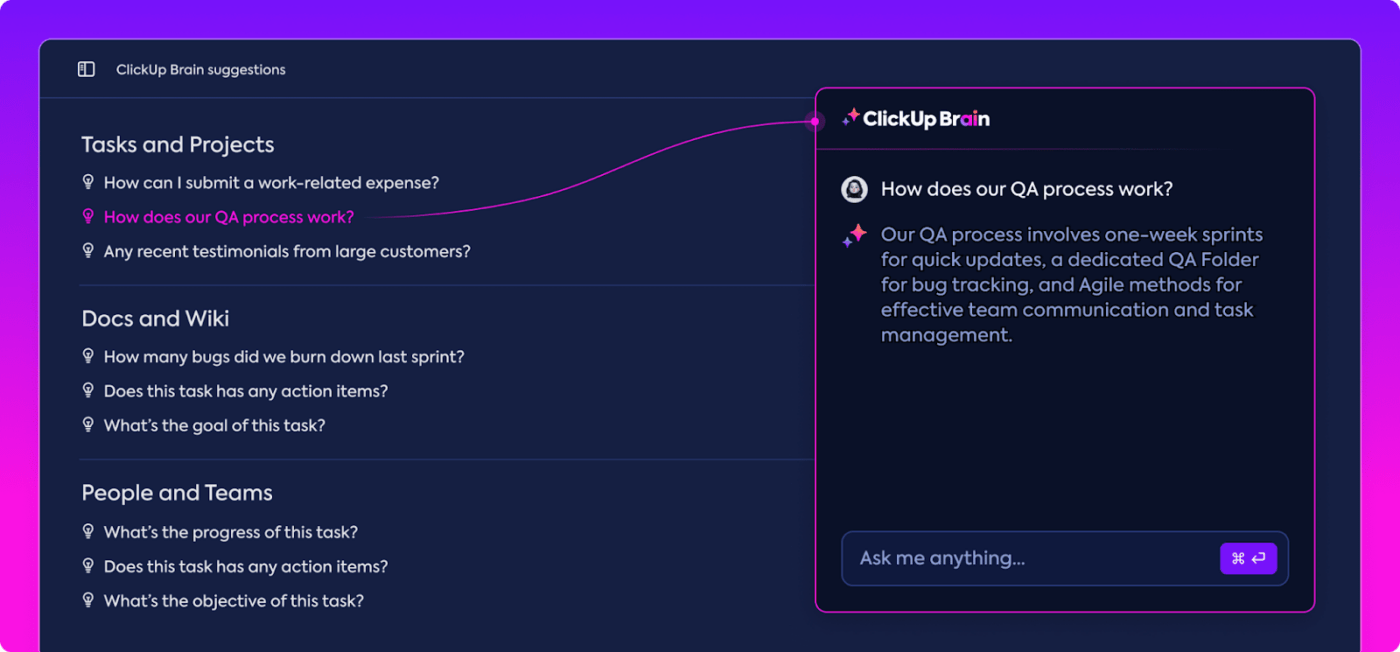
احصل على إجابات فورية لجميع أسئلتك باستخدام ClickUp Brain واستعد لتقييم أدائك
ارفع كفاءة عملك مع ClickUp Brain -يبسط المهام ويعزز التعاون ويوفر رؤى ذكية لتحسين سير عملك.
- إنشاء المحتوى: يساعدك ClickUp Brain على إنشاء محتوى فوري وعالي الجودة لمنشورات المدونة أو رسائل البريد الإلكتروني أو النسخ الإعلانية. هذاأداة الذكاء الاصطناعي قد غطتك بميزات قوية في البحث عن المحتوى ووضع الأفكار
- تلخيص جداول الأعمال: قم بتبسيط اجتماعاتك مع ClickUp Brain. فهو يلخص جداول الأعمال ويستخلص التفاصيل الحيوية ويوفر لك الوقت الثمين. ولا ينتهي الأمر عند الاجتماعات فقط - بل يمكنه تلخيص المستندات وسلاسل التعليقات ونشاط المهام الأخيرة وحتى إعداد تحديثات التقدم
- إنشاء القوائم: قم بإنشاء قوائم بسهولة باستخدام مساعدة ClickUp's Brain. سواء كانت قوائم مهام، أو عناصر المهام، أو الخطوط العريضة للمشروع، فإن الذكاء الاصطناعي يفهم السياق ويساعدك على إنشاء قوائم منظمة ومحددة الأولويات دون عناء
- إدارة المعرفة: احصل على إجابات لأسئلتك واستفساراتك المتعلقة بالمشروع دون مراجعة مستنداتك ومهامك ووثائقك الأخرى. احصل على تحديثات حول تقدم المهام أو إصلاح الأخطاء أو أي عناصر عمل معلقة
تبسيط المهام باستخدام أتمتة ClickUp
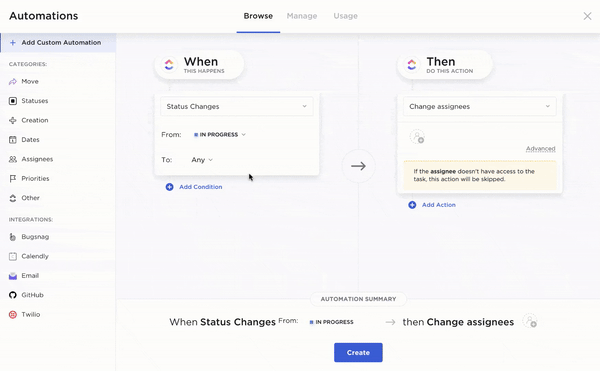
قم بإعداد أتمتة مخصصة بسهولة على ClickUp أتمتة ClickUp يتيح لك التركيز على ما يهمك حقًا - عملك. سواء كان تعيين المهام، أو تحديث الحالات، أو إرسال الإشعارات، فإن خيارات الأتمتة هذه تعمل على تبسيط العمليات، مما يلغي الحاجة إلى الإشراف المستمر.
إنها تعزز تركيزك من خلال تقليل عوامل التشتيت وتسمح لك بالتركيز على جوانب أكثر أهمية في عملك.
- الأتمتة المخصصة: قم بإنشاء خيارات أتمتة مخصصة وفقًا لأولوياتك والأهداف الأسبوعية. يمكنك أيضًا الاختيار من بين أكثر من 100 خيار أتمتة معدة مسبقًا وتخصيصها لتلبية احتياجاتك الخاصة
- أتمتة المهام: تبسيط سير عملك عن طريق تعيين المهام تلقائيًا وتغيير المُكلَّفين بالمهام ونشر التعليقات ونقل الحالات والمزيد
- تحديثات المهام: تحديث حالات المهام والمكلفين والعلامات والمزيد تلقائيًا استجابةً للتغييرات في الأولوية أو عند إنشاء مهمة جديدة
أهمية الإدارة المنضبطة للوقت ### أهمية الإدارة المنضبطة للوقت
تتبّع وقتك وجدولك الزمني بسهولة باستخدام قالب جدولة المواعيد من ClickUp
تساعدك الإدارة المنضبطة للوقت على الحفاظ على التركيز والتركيز في الحياة اليومية. عندما تقوم بتخصيص فترات زمنية محددة لأنشطة مختلفة، فإنك تعرف متى تركز على ماذا.
وعلاوة على ذلك، فإن إدارة الوقت المنضبطة لا تتعلق فقط بما يجب تحديد أولوياته؛ بل تتعلق أيضًا بما يلي تحديد الأولويات . تخلص مما لا يتوافق مع أهدافك أو أولوياتك حتى تتمكن من التركيز على ما يهمك.
إذا كنت لا تعرف من أين تبدأ، دعنا نساعدك.
- أنشئ قائمة مهام: ابدأ يومك بإدراج المهام حسب الأولوية. فقائمة المهام تبقيك منظمًا وتوفر لك خارطة طريق واضحة ليومك
- ضع أهدافًا واقعية: ضع في اعتبارك ما يمكنك إنجازه في إطار زمني محدد. فوضع أهداف قابلة للتحقيق يمنع الإرهاق ويدعم التركيز
- استخدام تقنيات مثل جدولة الوقت لجدولة الوقت: استفد من تقنيات مثل جدولة الوقت لجدولة الوقت معتطبيقات بومودورو وإنجاز المهام (GTD) التي توفر أساليب منظمة لإدارة الوقت وتحسينه لزيادة الإنتاجية. استخدمقالب حظر الجدول الزمني الخاص ب ClickUp ولا تدع سوء إدارة الوقت يوقعك في المشاكل
- ممارسة قاعدة الدقيقتين: قم بإنجاز المهمة فورًا إذا كانت المهمة تستغرق أقل من دقيقتين. فهذا يمنع المهام الصغيرة من أن تتراكم وتتطلب الاهتمام في وقت لاحق
دور اليقظة الذهنية والتأمل في تعزيز التركيز
يعزز اليقظة الذهنية والتأمل التركيز من خلال تدريب العقل على البقاء حاضرًا ومنتبهًا. فاليقظة الذهنية تجعلك مدركًا لأفكارك ومحيطك، بينما التأمل هو أسلوب لتدريب عقلك على اليقظة الذهنية والتركيز على أشياء مثل التنفس.
تجعلك الممارسة المنتظمة تجعلك أكثر وعيًا بأفكارك ومشاعرك، مما يمكّنك من إعادة توجيه انتباهك إلى المهمة التي بين يديك. وهذا يساعدك على التركيز، والتحكم في المشتتات، وفي النهاية تعزيز التركيز والتركيز بشكل عام.
إليك تقنية بسيطة لكنها فعالة لتعزيز تركيزك. ابحث عن مكان هادئ واجلس براحة وركز على تنفسك. خذ شهيقاً وزفيراً بشكل طبيعي، مع الانتباه لكل نفس. وعندما يشرد ذهنك، أعده برفق إلى أنفاسك. ستؤدي الممارسة المستمرة إلى تحسين تركيزك وتركيزك بشكل عام.
العلاقة بين نظافة النوم وزيادة التركيز ### العلاقة بين نظافة النوم وزيادة التركيز
تُعد الممارسات الصحية الجيدة للنوم جزءًا لا يتجزأ من تعزيز التركيز وتحسين الوظيفة الإدراكية. تتضمن النظافة الصحية للنوم تعزيز جودة النوم، مثل الحفاظ على جدول نوم ثابت، وتهيئة بيئة نوم مريحة، وتجنب المنبهات قبل النوم.
يؤدي اتباع هذه الممارسات إلى تنظيم دورة النوم والاستيقاظ باستمرار، مما يؤثر إيجابًا على الانتباه والتركيز خلال ساعات الاستيقاظ.
فيما يلي بعض النصائح العملية لتحسين نظافة نومك والحصول على قسط كافٍ من الراحة لتعزيز التركيز المستمر في حياتك اليومية.
- جدول نوم متناسق: ضع جدولًا ثابتًا لوقت النوم والاستيقاظ كل يوم، بما في ذلك عطلات نهاية الأسبوع، لتنظيم ساعة جسمك الداخلية
- أنشئ روتينًا مريحًا قبل النوم: ضع طقوسًا مهدئة قبل النوم، مثل قراءة كتاب أو أخذ حمام دافئ، لإعطاء إشارة لجسمك بأن الوقت قد حان للاسترخاء
- انتبه إلى نظامك الغذائي: تجنب الوجبات الدسمة والكافيين والسوائل الزائدة قبل النوم للحصول على مزيد من النوم
- قلل من القيلولة: إذا كنت بحاجة إلى القيلولة، اجعلها قصيرة (حوالي 20-30 دقيقة) وتجنب القيلولة في وقت قريب جدًا من وقت النوم
نصائح حول تهيئة بيئة خالية من التشتيت
يتطلب العمل بفعالية على حل المشاكل المعقدة بيئة خالية من التشتت، ولكن تحقيق التوازن بين التعاون الجماعي والوقت الذي يركز على الأفراد أمر بالغ الأهمية.
ويمكنك تحقيق هذا التوازن من خلال تخطيط وقت لتفاعلات الفريق وتخصيص وقت يركز على الأفراد، مما يعزز بيئة إيجابية للعمل الفردي والتعاون الجماعي.
على الرغم من التحديات، إليك بعض النصائح لتقليل التشتت وتعزيز التركيز.
- إزالة الفوضى: قم بإزالة المشتتات والأشياء غير الضرورية من مساحة عملك
- رتّب: نظّم: حافظ على ترتيب الأشياء حتى لا تبحث عن الأشياء التي تحتاج إليها
- الحد من الأدوات: قلل من استخدام الهواتف المحمولة والأجهزة الإلكترونية الأخرى لتقليل تشتيت الانتباه
- الهدوء منطقة: ابحث عن مكان هادئ للعمل دون مقاطعات مستمرة
- الرقمية التخلص من السموم: قم بإيقاف تشغيل الإشعارات غير الضرورية للحصول على منطقة خالية من التشتيت
- مريح مقعد: احرص على أن يكون مكان عملك مريحاً: تأكد من أن مساحة العمل الخاصة بك مريحة وتدعم الوضعية الجيدة
- الإضاءة الطبيعية الإضاءة: استخدم الضوء الطبيعي أو الإضاءة الطبيعية أو الإضاءة الموضوعة في مكان جيد من أجل بيئة مواتية
- أسس روتيناً: ضع روتيناً: قم بإنشاء روتين عمل متسق لتعزيز التركيز على ما إذا كنت شخصًا صباحيًا أو مسائيًا
أهمية عادات نمط الحياة الصحية للحفاظ على التركيز
نمط الحياة المتوازن له تأثير مضاعف على أدائك المعرفي بشكل عام. دعنا نلقي نظرة على أهمية نمط الحياة الصحي وكيف يؤثر على تركيزك وإنتاجيتك في مكان العمل.
- التغذية: إن تناول نظام غذائي متوازن يوفر العناصر الغذائية الأساسية التي تدعم وظائف الدماغ، مما يساعد على تعزيز القدرات الإدراكية والتركيز المستمر
- الصحة البدنية: يمكن أن تؤدي ممارسة التمارين الرياضية بانتظام أو حتى مجرد المشي لمسافة قصيرة إلى زيادة تدفق الدم إلى الدماغ وإطلاق المواد الكيميائية التي تحسن المزاج والتركيز، مما يساهم في زيادة الإنتاجية
- النوم الكافي: النوم الجيد أمر بالغ الأهمية للاحتفاظ بالذاكرة والأداء المعرفي بشكل عام، مما يؤثر بشكل مباشر على اليقظة والتركيز خلال ساعات الاستيقاظ
- إدارة الإجهاد: ممارسات نمط الحياة الصحية، مثل اليقظة الذهنية والأنشطة التي تقلل من الإجهاد، تقلل من الإجهاد وتخفف من آثاره السلبية على الوضوح الذهني
- الجفاف: يمكن أن يؤدي الجفاف إلى إضعاف الوظيفة الإدراكية وتأخير إشارات الدماغ. لذا، فإن الحفاظ على مستويات الترطيب المناسبة أمر حيوي للحفاظ على التركيز المستدام والرفاهية بشكل عام
- العلاقات الاجتماعية: يساهم الحفاظ على حياة اجتماعية صحية في الرفاهية العاطفية وتقليل الشعور بالعزلة وتعزيز الصحة النفسية بشكل عام، مما يؤثر إيجابًا على الإنتاجية
- تكوين عادات صحية:حافظ على التركيز والانضباط معمتتبع العادات في ClickUp الذي يساعدك على تتبع العادات وإدارتها. يساعد النهج الشامل لنمط الحياة الصحي على تنمية عادات إيجابية تصبح مع مرور الوقت متأصلة في النفس، مما يؤدي إلى تحسينات طويلة الأجل في التركيز
تم تصميم نموذج تعقب العادات الشخصية من ClickUp لمساعدتك على تتبع عاداتك وأهدافك اليومية.
تعامل مع المهام الصعبة أولاً لزيادة التركيز
يمكن أن يؤدي بدء يومك بمعالجة المهام الصعبة أولاً بأول إلى زيادة التركيز بشكل كبير على مدار اليوم.
عندما تنغمس في المهام الصعبة، يكون ذهنك منتعشًا، وتكون مستويات طاقتك الذهنية عالية. ويؤدي ذلك إلى الشعور بالإنجاز، مما يؤدي إلى تأثير نفسي إيجابي. إن الرضا الناتج عن التغلب على التحدي الصعب يفرز الدوبامين، وهو مادة كيميائية مرتبطة بالمكافأة والتحفيز، مما يبني الزخم لبقية اليوم.
وعلاوة على ذلك، فإن معالجة المهام الصعبة أولاً يقلل من التوتر الذي يلوح في الأفق والفوضى الذهنية الناجمة عن التسويف. أنت تحرر مساحة عقلية مما يتيح لك التركيز بشكل أفضل على المهام اللاحقة.
لذا، ضع في اعتبارك تبنيها أولاً في المرة القادمة التي تميل فيها إلى تأجيل مهمة صعبة!
إدارة الصحة العقلية من أجل التركيز الأمثل
يساعدك الاهتمام بصحتك العقلية على تحقيق التركيز الأمثل. كسر دائرة التوتر يعيد لك التركيز.
يمكن أن يؤدي تطبيق تقنيات إدارة الضغط النفسي إلى تحسين صحتك العقلية بشكل كبير، وتعزيز الشعور بالهدوء، وتمهيد الطريق لتحسين التركيز والتركيز في حياتك اليومية.
- خذ فترات راحة قصيرة: ادمج فترات راحة قصيرة في يومك، لتعمل بمثابة زر إعادة ضبط التركيز الذهني لتعزيز التركيز بشكل عام
- التمس الدعم: لا تتردد في الاتصال بالأصدقاء أو العائلة أو أخصائي الصحة النفسية. فالعقل السليم، المدعوم بشبكة علاقات قوية، هو مفتاح تحسين التركيز والصحة البدنية بشكل عام
- استزرع الإيجابية: حافظ على الحافز وتخلص من السلبية والشك في النفس، واستبدلها بتأكيدات وأفكار بناءة لتعزيز التركيز
تحسين تركيزك في العمل
وها أنت ذا - الدور المحوري للتركيز في دفع الإنتاجية في مكان العمل المعاصر ودليل شامل حول كيفية التركيز وسط كل هذه الفوضى
في عالم اليوم، يعد الحفاظ على التركيز أمرًا بالغ الأهمية لتحقيق أفضل النتائج. من التلاعب بالمشتتات الرقمية إلى تعدد المهام، نحتاج إلى حلول استباقية. إن تجربة اليقظة الذهنية وصقل مهارات إدارة الوقت وإنشاء مساحة ملائمة للعمل هي خطوات حيوية لتعزيز التركيز.
لا يؤثر نقص التركيز على الأداء الشخصي فقط؛ بل يمتد أثره إلى فرق العمل والنتائج الإجمالية.
يتطلب خلق ثقافة تعتمد على التركيز مبادرات التعلم المستمر في مكان العمل. إن مناقشة الاستراتيجيات الفعالة ومشاركة النجاحات واستكشاف الحلول يعزز التعاون.
من خلال ميزات مثل إدارة المهام وتتبع الوقت وتحديد الأهداف، يُعد ClickUp، أحد أفضل تطبيقات تطبيقات التركيز يساعد الفرق في الحفاظ على تنظيمها وتركيزها على أهدافها. اشترك مجاناً وحافظ على تركيزك طوال يومك.
الأسئلة الشائعة
**1. لماذا لا يبدو أنني لا أستطيع التركيز في العمل؟
إذا كنت تجد صعوبة في التركيز في العمل، فقد يكون السبب في ذلك هو المشتتات الرقمية، أو تعدد المهام، أو ضجيج العمل الحديث. يمكن أن يساعدك تحديد السبب في إيجاد الحلول واستعادة ذلك التركيز.
**2. كيف يمكنك التركيز في العمل عندما تكون مرهقًا للغاية؟
يمكن أن يكون التوتر والقلق في العمل قاتلاً للتركيز. قم بتقسيم المهام إلى أجزاء صغيرة، وخذ فترات راحة قصيرة، وأحيانًا ابتعد لدقيقة واحدة. يساعدك ذلك على استعادة المنظور الصحيح ويحافظ على تركيزك وسط الفوضى.
**3. كيف يمكنني استعادة تركيزي في العمل؟
حاول تقسيم المهام إلى أجزاء صغيرة يمكن التحكم فيها لاستعادة تركيزك في العمل. حدد أولويات قائمة مهامك، وقم بترتيب قائمة مهامك، وقم بترتيب مساحة عملك، وحدد فترات زمنية محددة للعمل المركز.
جرب التقنيات لتجد ما يناسبك بشكل أفضل، ولا تنسَ أن تحافظ على رطوبة جسمك وأن تحصل على قسط كافٍ من الراحة - فالتعديلات الصغيرة يمكن أن تحدث فرقًا كبيرًا في استعادة تركيزك على المسار الصحيح.


